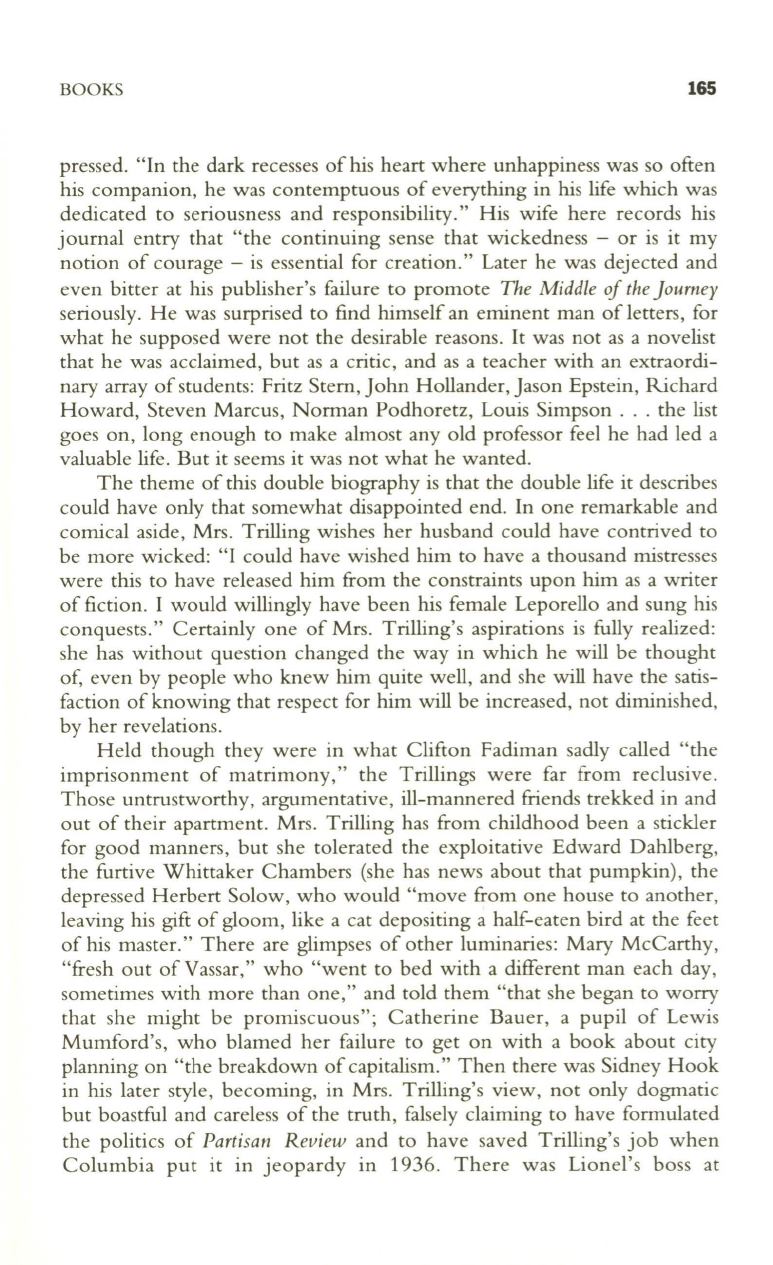
BOOKS
165
pressed. "In the dark recesses of his heart where unhappiness was so often
his companion, he was contemptuous of everything in his life which was
dedicated to seriousness and responsibility." His wife here records his
journal entry that "the continuing sense that wickedness - or is it my
notion of courage -is essential for creation." Later he was dejected and
even bitter at his publisher's failure to promote
The Middle of the Journey
seriously. He was surprised to find himself an eminent man of letters, for
what he supposed were not the desirable reasons. It was not as a novelist
that he was acclaimed, but as a critic, and as a teacher with an extraordi–
nary array of students: Fritz Stern, John Hollander, Jason Epstein, Richard
Howard, Steven Marcus, Norman Podhoretz, Louis Simpson . . . the list
goes on, long enough to make almost any old professor feel he had led a
valuable life. But it seems it was not what he wanted.
The theme of this double biography is that the double life it describes
could have only that somewhat disappointed end. In one remarkable and
comical aside, Mrs. Trilling wishes her husband could have contrived to
be more wicked: "I could have wished him to have a thousand mistresses
were this to have released him from the constraints upon him as a writer
of fiction. I would willingly have been his female Leporello and sung his
conquests." Certainly one of Mrs. Trilling's aspirations is fully realized:
she has without question changed the way in which he will be thought
of, even by people who knew him quite well, and she will have the satis–
faction of knowing that respect for him will be increased, not diminished,
by her revelations.
Held though they were in what Clifton Fadiman sadly called "the
imprisonment of matrimony," the Trillings were far from reclusive.
Those untrustworthy, argumentative, ill-mannered friends trekked in and
out of their apartment. Mrs. Trilling has from childhood been a stickler
for good manners, but she tolerated the exploitative Edward Dahlberg,
the furtive Whittaker Chambers (she has news about that pumpkin), the
depressed Herbert Solow, who would "move from one house to another,
leaving his gift of gloom, like a cat depositing a half-eaten bird at the feet
of his master." There are glimpses of other luminaries: Mary McCarthy,
"fresh out of Vassar," who "went to bed with a different man each day,
sometimes with more than one," and told them "that she began to worry
that she might be promiscuous"; Catherine Bauer, a pupil of Lewis
Mumford's, who blamed her failure to get on with a book about city
planning on "the breakdown of capitalism." Then there was Sidney Hook
in his later style, becoming, in Mrs. Trilling's view, not only dogmatic
but boastful and careless of the truth, falsely claiming to have formulated
the politics of
Partisan Review
and to have saved Trilling's job when
Columbia put it in jeopardy in 1936. There was Lionel's boss at


